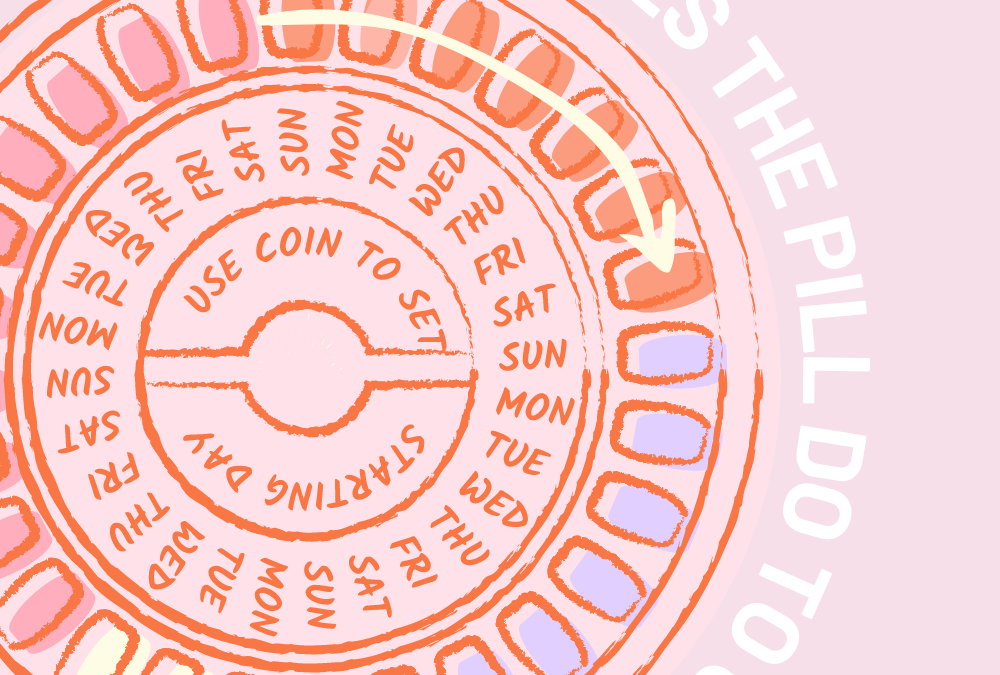What effect does the birth control pill have on the body? What is the effect on our cycle? On our periods? Does our cycle even work the same?
In this article, I go through what every woman should know before taking the pill (or any other hormonal contraception). The goal is not to discourage you from taking the pill but simply to inform you.
Because I believe that every women has the right to be informed and to make the choices that suits her and her body.
How the cycle works naturally
Before we talk about how our cycle behaves under hormones, let’s remind ourselves how our cycle works naturally.
The cycle can be divided into four phases:
1) Menstruation : This phase indicates a new cycle since it begins on the first day of the period. It’s a sign that there hasn’t been a pregnancy in the previous cycle.
2) The post-menstrual or pre-ovulatory phase : This is when your body develops an egg and sets the stage for a possible pregnancy (due to a rise in estrogen)
3) Ovulation : This is the moment when the egg is released under the influence of the LH hormone. This phase lasts about 24 hours and is the perfect time to get pregnant.
4) The pre-menstrual or post-ovulatory phase : In the last phase, progesterone levels are high and allow the endometrium to thicken to accommodate a possible embryo.
If fertilization has occurred, hormone levels remain high throughout the pregnancy. If not, the progesterone and estrogen levels drop and cause the endometrium to shed (aka menstruations).
Related post : How the 4 phases of the cycle affect your daily life
As you can see, our bodies naturally produce varying amounts of hormones. But what happens when we give it even more, which are artificial?
The menstrual cycle on the pill
By taking the pill, the body receives hormones continuously and the levels are therefore constant.
We have seen that in a natural cycle, it is the variation of hormones that triggers the development of the egg, its release, the thickening of the endometrium, and periods.
When your body is constantly receiving artificial hormones, these variations no longer occur. All of the above steps do not take place.
Taking hormones:
- Blocks ovulation
- Thickens the cervical mucus to prevent sperm from reaching the uterus
- Thins the endometrium to prevent a fertilized egg from implanting
In fact, taking hormones mimics the state of pregnancy with its high levels of progesterone and estrogen (source).
This is how it is : the natural cycle is completely put on hold.
But if the hormones mimic a pregnancy, why do we still get a period when taking the pill?
“Periods” on the pill
Depending on the type of pill, there is a break in the intake of hormones after three weeks. From one day to the next, the body finds itself with fewer hormones than before.
This drop in hormones will cause the endometrium to shed, as it would happen in a natural cycle. Under the pill, we do not speak about periods but about withdrawal bleeding.
The reason there is a “break” phase between two pill packs has nothing to do with allowing your body to “clean up” or “purify” itself.
Wait for it.
When the pill was first introduced in the 1950s, the founders thought that in order to be accepted by society, it shouldn’t look like the natural menstrual cycle was disturbed.
Since the pill mimics pregnancy and therefore does not include ovulation or menstruation, they thought that making us bleed artificially would be the solution (source).
And so they did.
You read that right. Bleeding on the pill is artificial and totally unnecessary.
There is no medical or scientific reason for it. Only reassuring women about their fertility and fitting with religious traditions.
What the heck, I know.
Conclusion: There wouldn’t be any issues to take the pill continuously or skipping periods under contraception since they were only planned in order to reassure society.
The effects of the contraceptive pill on the body
Although skipping your period would affect your body, taking artificial hormones every month can cause many side effects.
On your mental health…
- Depressive tendencies
- Mood swings
… on your sexual health …
- Low libido
- Vaginal dryness
… and your physical health too.
- Sensitive breasts
- Water retention
- Cravings
- Difficulty to lose weight
- Blood clots (more common in women over 35)
In addition, the pill is not recommended for women who smoke, have high blood pressure, or who have a link with cancer or heart disease.
If you notice one or more of these side effects after taking your birth control, it may not be the right one for you. Think about talking to your gynecologist 🙂
For my part, I didn’t notice the effects of the pill until I stopped it after 4 years. And there was more than one. If you’re interested, I share with you what happened to me when I went the pill in this article.
When I learn about this kind of information, I can’t believe no one told us about this earlier. Not even when our periods came as teenagers, not even when we are prescribed the pill.
How crazy is that?
That being said, I hope you learned something from this article about what the birth control pill does to your body. These are things that I wish I had known long before and that would have probably made me think a little more before taking the pill.
This is one of the reasons why I now use the fertility awareness method, which is a natural birth control method (I explain how it works in this article).
But again, if the pill or any other hormonal contraception suits you and you are happy with it, then that’s completely fine. Choose what works for you.
Let me know if you learned anything new from this article and what you think about it in the comments below!


I love this post! So much amazing information about how the pill can effect a woman’s hormonal cycle! I have a similar blog in terms of health and wellness! I’m glad I have found a likeminded woman like yourself ❤️
Hi Hailee, thank you for your kind comment, it means a lot💖
Yayyy I will definitely check out your blog – I love to see women inspiring and empowering other women to take care of their health & wellness!
Thank you so much it’s been months trying to loose weight and no difference, especially on my stomach yooo🥹. I know now thank you so much
Same for me when taking the pill, my body was so inflamed and I couldn’t lose the “excess” weight that was caused by it 🙁 My body changed so much since getting off of hormonal birth control. I hope you’ll find a way to feel better🫶🏻